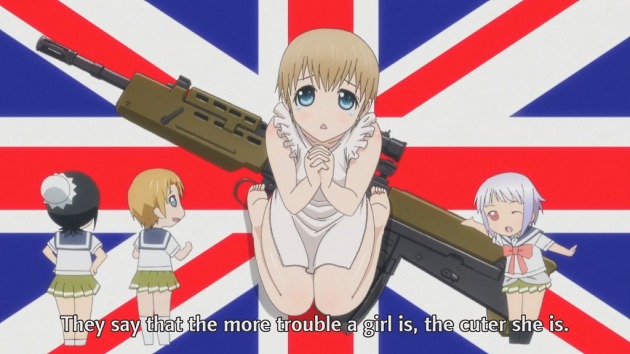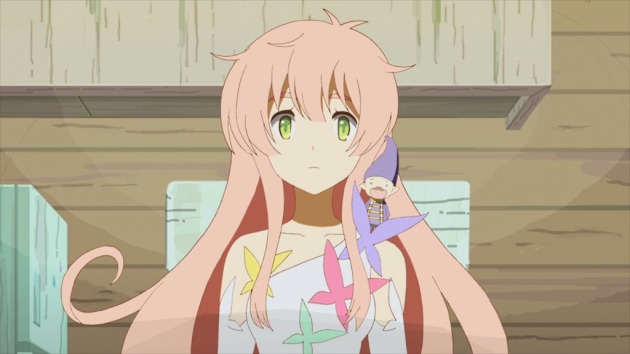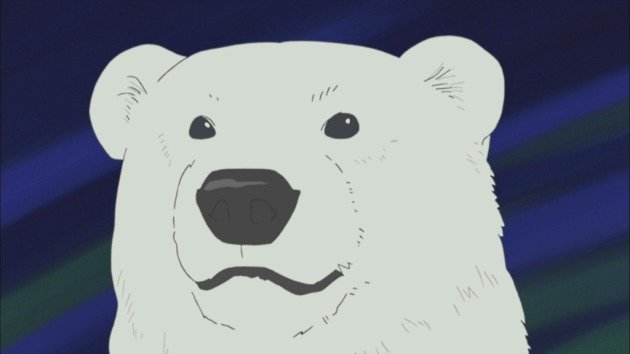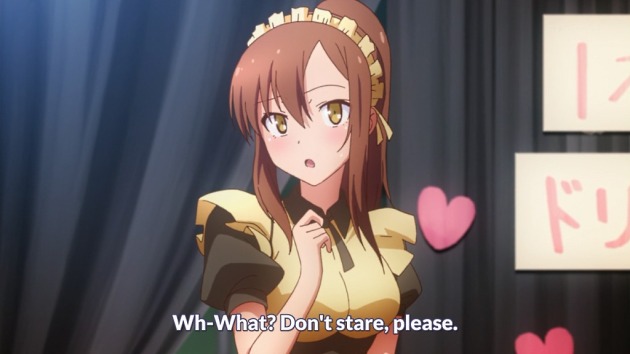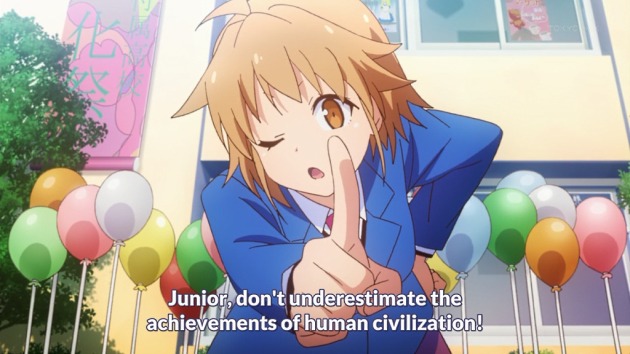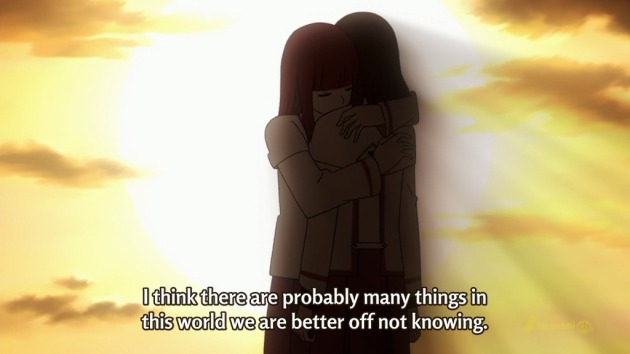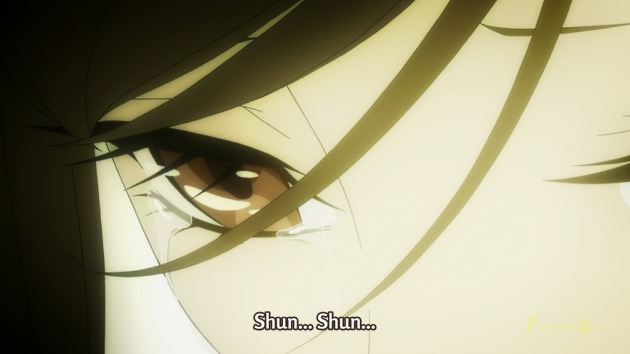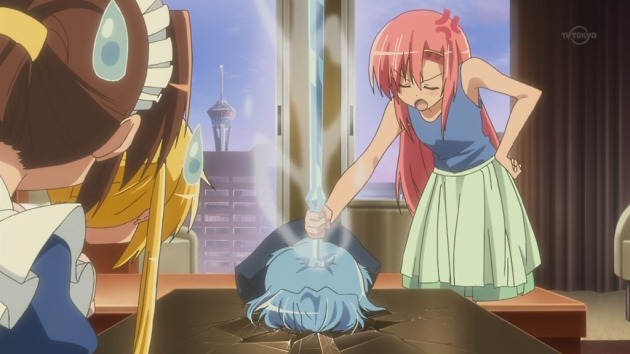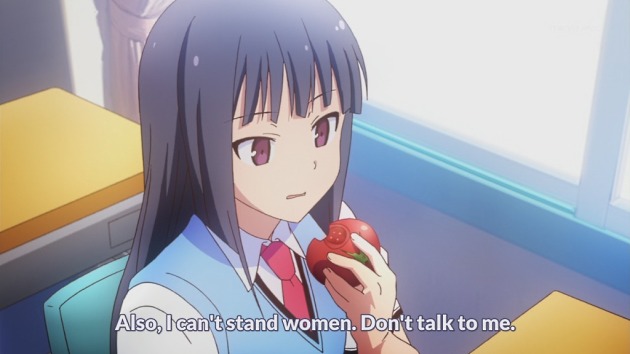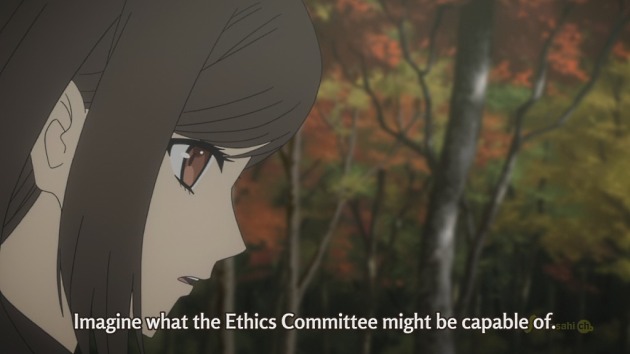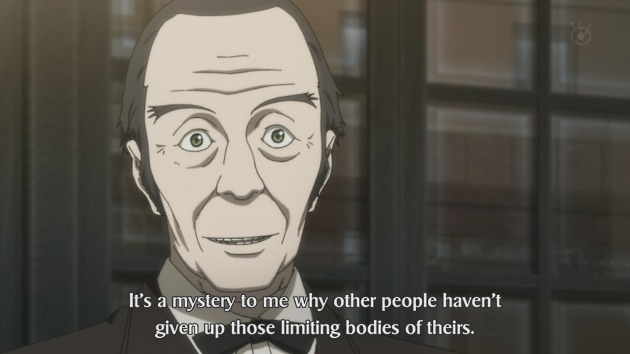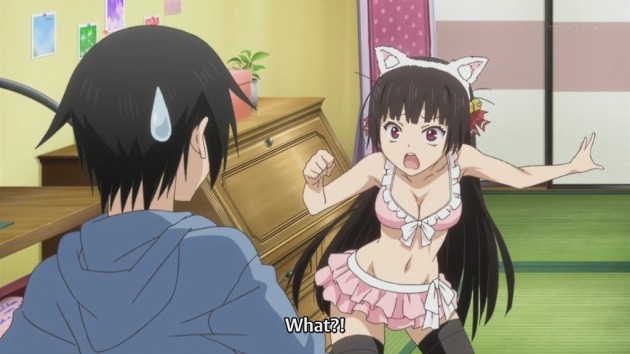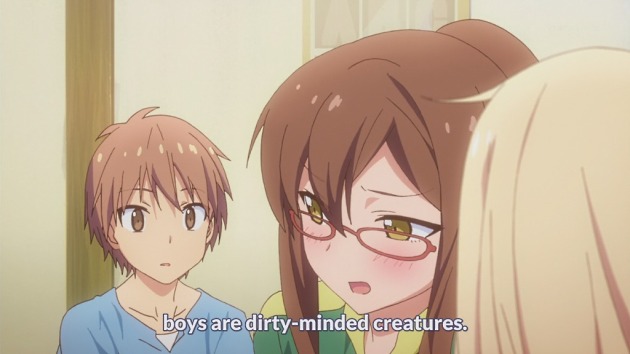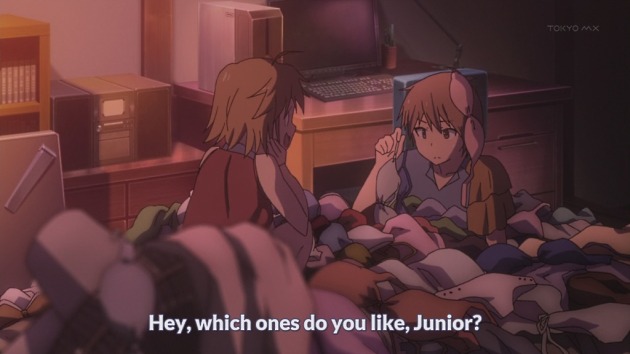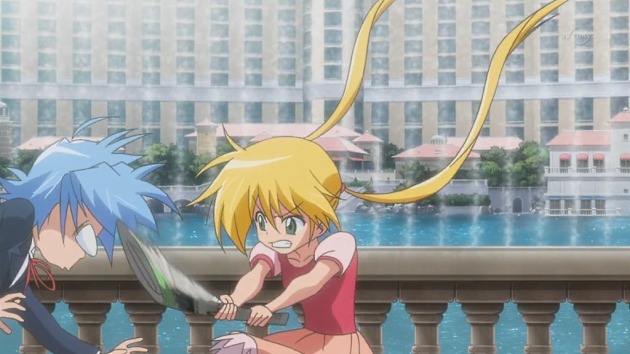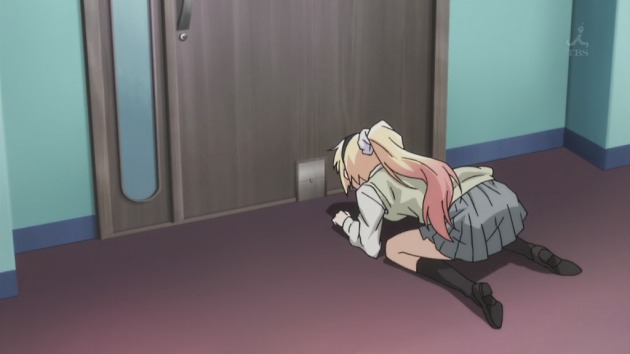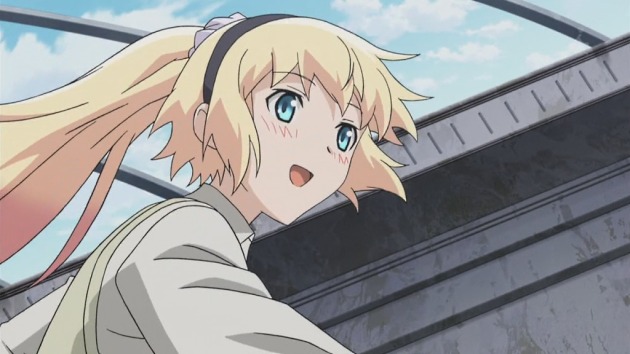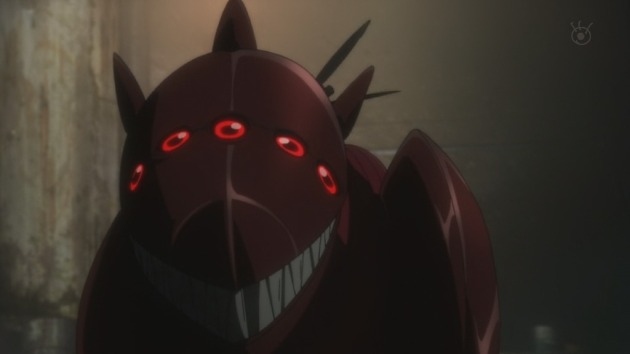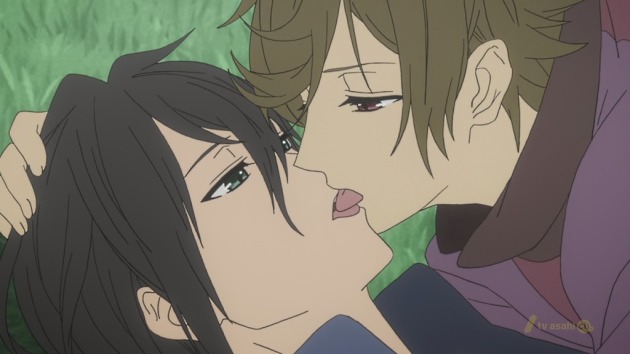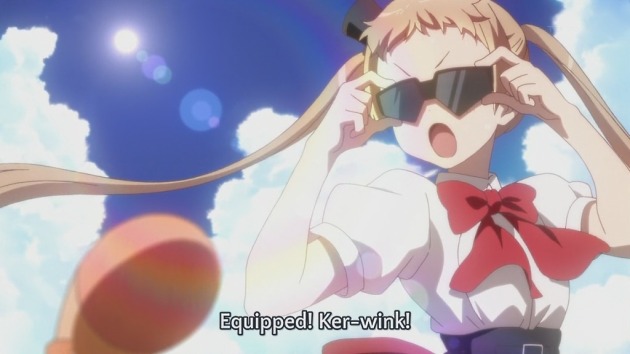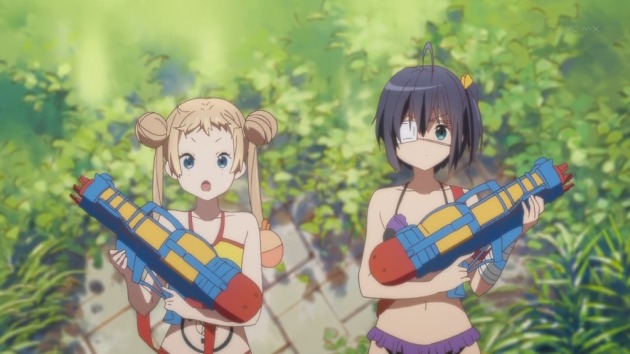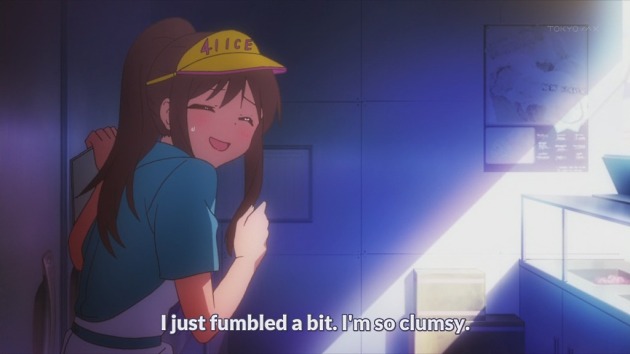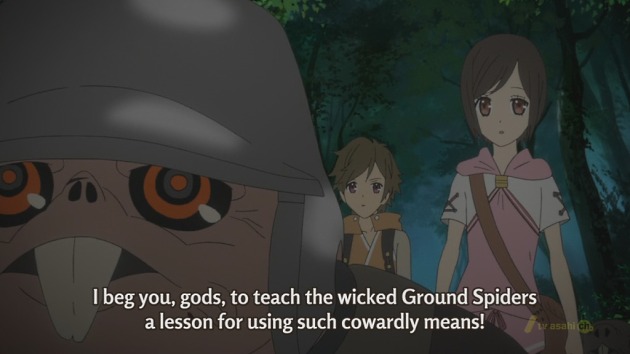Hey, remember 2012? It had some good anime, right? Well, that’s sort of questionable, but here are the ten least-bad, anyway. To be eligible for the ranking, a show had to begin airing in 2012, not be a direct sequel to an earlier series (shows that just vaguely share an IP like the various Gundams are ok though), and it had to be TV-serial-format (because I want to exclude movies, but not Upotte, even though it didn’t technically air on TV IIRC). Shows that haven’t finished airing are judged on what they’ve aired so far, and descriptions may contain spoilers.
10: Chuunibyou Demo Koi ga Shitai! (Even Though I’m Chuunibyou I Want To Fall In Love!)

This show was less than the sum of its parts. It was funny as a character comedy about a chuunibyou girl shouting names of her special attacks in mundane situations and wearing wheelie shoes because they look cool as heck. It was cute as a romance between a reformed chuunibyou and a currently active one and their awkward interactions. And it was moving and thought-provoking as a meditation about the nature of personal identity and how society is a Lovecraftian horror that will devour you alive. But somehow it didn’t really weave those various threads together very well. At least it was nice to look at, since it was a Kyoto Animation show. That’s sort of becoming their signature, beautiful shows that don’t quite work.
9: Upotte!

Upotte is a show in the “womanifying objects” genre, like the hilariously bad show Akikan, except instead of aluminum cans, the girls in Upotte are assault rifles. (One imagines they shoot at the girls of Akikan for target practice.) This was a surprisingly good show given the premise. They made a lot of ridiculously obscure jokes about specific models of gun, but it was ok, because they always made sure to have a narrated voiceover explain what the point of the joke was, so I could be like “oh! haha! I bet that would have been pretty funny to someone with an encyclopedic knowledge of rifles!” So I felt like I was learning things about guns, just like Yakitate Japan helped me have a better appreciation for bread. Unfortunately the gun jokes were married to a sort of generic school-life comedy that included some really over-the-top fanservice. I dunno if fanservice is even the right word, that implies a sort of a seductive restraint that Upotte didn’t really have. Like, if you ever wanted to see an assault rifle masturbating, there are a couple of scenes where it is just right there bluntly on the screen, no coy implications or anything. I guess that’s why Upotte only aired on the internet?
8: Danshi Koukousei no Nichijou (The Daily Lives of High School Boys)

Danshi Koukousei no Nichijou was the answer to the four-girl-slice-of-life-comedy genre, it looked at things from a male perspective. And to its credit, it didn’t just genderswap all the girl comedy tropes, but it actually made jokes about the nature of adolescent masculinity, about the emotional toll that being expected to be manly and unemotional can take. The major theme of the show was taking a look at how high school boys really feel, and contrasting that with how they act to keep up the facade that society expects of them. It was a really unique show with a mature perspective on things, and it definitely wins points for that, but sometimes I felt like there just weren’t enough jokes in it. It’s supposed to be a comedy, right? And sometimes the high school boys were realistically awful to each other, which made me sad, which made me less receptive to the jokes. All in all, I’m glad this show exists, but I only sort of enjoyed watching it.
7: Joshiraku (Girls’ Rakugo)

Joshiraku was really hit-or-miss in terms of its comedy. It was by the same original author as Sayonara Zetsubou Sensei, and had the same flaws and advantages as that show. The advantage is that the show had ridiculous conversations that could flip back and forth effortlessly between topics to spin beautiful absurd word tapestries out of dreams and nonsense. The flaw is that the topics frequently were subtle satires of Japanese politics or local references to specific neighborhoods of Tokyo, and as a stupid American I can’t understand the jokes. I bet if I were Japanese Joshiraku would be ranked higher than seventh place, but I’m not.
6: Accel World

Accel World started off pretty strong. It was a show about a secret online VR game, a little shounen-y and action-y, but it avoided most of the traps of that genre. The rules of the game basically made sense, they didn’t layer any sort of over-the-top nonsense like “if you die in the game you die in real life” on it (seriously SAO was so bad), they made the story about kids playing a game, instead of just giving it a game flavor and then telling the same old save-the-world story. I liked the characters, too, especially the male lead, who was my pick for best male character of the year. Unfortunately, as the show ran on, it became more and more like typical shounen trash. The low point of the story was when it turned out there was a secret ability to use the power of imagination to do anything you wanted in the game and ignore the rules. That spits in the face of the whole point of making a show about a game! The first six or so episodes were great, but by the end, the show had declined to “sort of enjoyable, I guess”. The fight scenes were still pretty cool, full of burning justice and all that jazz. If that’s what you’re into.
5: Psycho-Pass

Psycho-Pass is still airing, but it seems pretty decent so far. They don’t go as far as they might with the premise of the role of police in a society in which the cops can look at your brain and throw you in prison based on your criminal tendencies, but it’s better than going too far. Psycho-Pass is still cool even if it’s just a future police procedural. I like their vision of a future society ruled by an all-powerful AI, and how people just sort of keep on keeping on, dealing with the demands of the Sybil System just like we Americans deal with the demands of Modern Liberal Democracy. More interesting than stories of utopia or dystopia are stories of ambitopia, a society that’s different from ours, but not obviously better or worse. Those stories are more honest in how they explore the nature of societal change and what makes a society good or bad. Those are topics I enjoy thinking about, so that’s why I’m more interested in the glimpses of everyday life that sometimes crop up in this show than I am in the cop stories that form its heart.
4: Nazo no Kanojo X (Mysterious Girlfriend X)
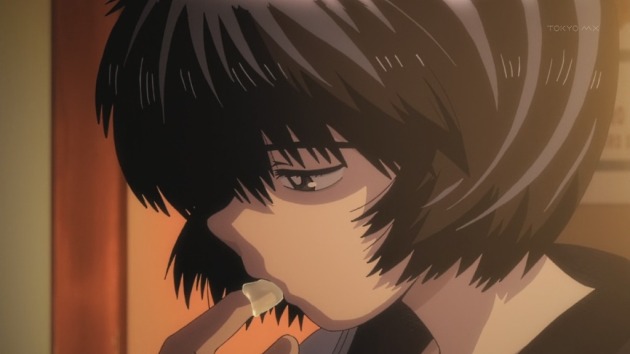
Nazo no Kanojo X is probably the best anime it is possible to create on the topic of drinking other people’s saliva. Yes, the relationship between the male lead and the female lead is sort of weird and incomprehensible and a little bit gross, but there is an ~*artistic*~ reason for that. It’s because when you’re young, and getting into your first serious romantic relationship, love and sex are sort of weird and incomprehensible and a little gross. If the two of them had a normal romance, with less finger-licking goodness, then it wouldn’t convey the honest truth of a young man’s first fumbling steps into love to us, the jaded audience who has had tons of romantic interactions and basically knows how they work by now. By keeping us guessing it helps us empathize with the protagonist, who is kept guessing. It’s a really neat effect, and it makes for a cool romance anime, even if sometimes the characters are not as fleshed out as I would like.
3: Sakamichi no Apollon (Apollon of the Hill Road) (Kids on the Slope)

Sakamichi is the first show on this list I can wholeheartedly recommend. It’s in theory a show about jazz, but really it’s more a story about youth. The main character starts out as an uptight classical pianist rich kid, he meets a poor kid who plays jazz, he realizes there’s a whole other world out there, his horizons expand… It’s maybe just an ordinary coming-of-age story, but it’s set in 1960’s rural Japan, and with jazz music as the sort of centerpiece, so it manages to stay interesting. It’s a very earnest story, an honest story, a story that doesn’t have enough jazz in it, but in that way it’s sort of a metaphor for life, because life also doesn’t have enough jazz in it. Man, I don’t even like jazz, what am I talking about? I guess that’s a sign of how powerful a story Sakamichi no Apollon is, to make me think I want more jazz in my life.
2: Shin Sekai Yori (From The New World)

Shin Sekai Yori is still airing, but what has aired so far has been great. It’s a story set in a post-apocalyptic demon-haunted world, a world where humans can use magical powers, but it’s pretty far from the standard fantasy tropes. It’s a serious look at what sort of society could survive despite human frailty if humans had the power to massively reshape their surroundings on a whim. The demon-haunting and magic give it a nice atmosphere (and it’s a really nice atmosphere, for sure), but essentially this is a story about sociology, it’s a story about what would happen if the Progressive Ideology had to deal with real, serious, existential threats. The story is told from the perspective of children growing up in this world, struggling to deal with their powers and the unreasonable demands that society places on them. I’m not sure what the moral will end up being, since it’s still airing, but it’s given me a lot to think about already.
1: Jinrui wa Suitai Shimashita (Humanity Has Declined)

My pick for best anime of the year is Jinrui wa Suitai Shimashita, a satire about the waning days of humanity. This isn’t a story about the aftermath of some major apocalyptic event. Humanity wasn’t destroyed, it just declined. The new dominant species on the earth is fairies, and this is a show about a girl who acts as a liaison between humans and fairies. As expected from a show about fairies, it’s very soft and pastel. But it’s also hilariously funny. It’s a difficult trick to pull off, being funny without being mean, but Jintai is just about the nicest satire I’ve ever seen. It’s not bitter about the follies of humanity – after all, what’s the point in kicking a declining humanity when it’s down? A lot of the humor in the show derives from humanity trying to cling to their old accustomed dignities even after their civilization has been reduced to an afterthought, but that’s part of what makes Jintai such a surprisingly optimistic show. People are still people, even after humanity’s decline. Species come and go, the show seems to say, it’s nothing to get worked up over. I’m not sure I agree, but it’s certainly interesting to watch.










